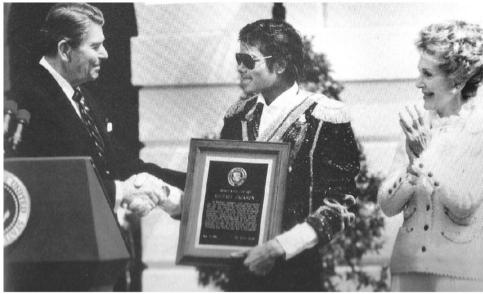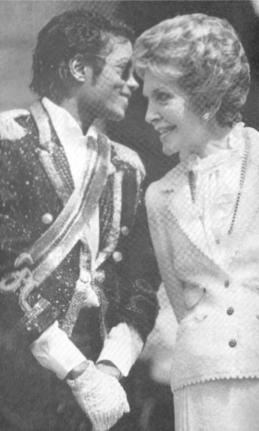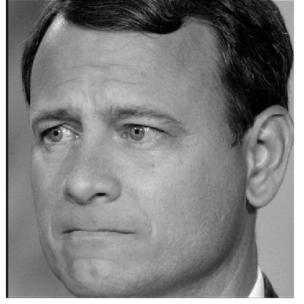Jacko, His Rise and Fall: The Social and Sexual History of Michael Jackson (40 page)
Read Jacko, His Rise and Fall: The Social and Sexual History of Michael Jackson Online
Authors: Darwin Porter

Partly because of Michael's phenomenal success, Jagger became obsessed
with him, grasping every detail he could learn both about his private life and
his financial deals. Mainly, he wanted to know how many records he sold.
Arthur Collins, an executive at Atlantic Records, remembered Jagger storming into his office, demanding to know, for example, how many records
Michael had sold in France.
Meanwhile, from her digs at Princeton University, where she was enrolled
as a student, Brooke was bubbling with enraged jealousy. Michael had not called her, and it was only through the tabloids that she learned that Michael
was in New York. Even worse, instead of selecting her as his date for the Kool
and the Gang Concert, he had invited Tatum instead.
As it turned out, Brooke and The Donald weren't the only celebrities who
wanted to pose for photographs with Michael. About this time, an invitation
arrived from the Reagans, summoning Michael to the White House.
Brooke had a motive for calling Michael. She wanted to be his "date" for
his meeting with the Reagans. When Brooke finally got through to him, and
learned about his invitation to the White House, she proposed that she accompany him to Washington.
Michael adamantly refused, putting down the phone.
The story behind the story about why Michael had been invited to meet
the Reagans was revealed years later.
The invitation to the White House had not originated from the Reagans,
but had come about through Elizabeth Dole, the homophobic Secretary of
Transportation and the wife of failed presidential candidate Robert Dole, who
ran a lackluster campaign against Bill Clinton in 1996 before becoming a
spokesman for Viagra.
Dole had called Michael's attorney, John Branca, asking permission to use
"Beat It" as background music for a thirty-second TV commercial aimed
against drunk driving. When Branca informed Michael of this, he flatly
refused. But upon reconsideration, he granted permission, "But only if I'm
invited to the White House to receive an award."
When Branca conveyed Michael's request to Dole, she said that she
thought the award ceremony could be arranged.
To White House advisors, Dole suggested that Michael receive some kind
of humanitarian award, as a means of thanking him for his role in showing
young people how successful a life could be if it was "free from alcohol and
drug abuse." Later revelations about Michael's own drug and alcohol abuse
would make a mockery of this award.
At least one official at the Reagan White House bitterly opposed the idea
of an award for Michael. That official would later become one of the most
powerful men in America.
In 2005, long after Michael's presidential citation, researchers found several memos from a Reagan White House lawyer, John Roberts. Yes, the John
Roberts who now presides over the U.S. Supreme Court. In his memo, he
protested the idea of granting an award to Michael, stating that it would be
demeaning to the President. "If one wants the youth of America and the world
sashaying around in garish sequined costumes, hair dripping with pomade,
body shot full of female hormones to prevent voice change, mono-gloved,
well, then I suppose 'Michael'-as he is affectionately known in the trade is in fact a good example. Quite apart from the problem of appearing to
endorse Jackson's androgynous lifestyle, a Presidential award would be perceived as a shallow effort by the President to share in the constant publicity
surrounding Jackson."
Dole managed to short-circuit objections from Roberts by appealing
directly to the more star-struck Nancy, who approved the granting of a citation for Michael. She believed that his appearance would benefit her "Just
Say No to Drugs" campaign. Consequently, the path was officially cleared for
Michael's arrival in Washington for the presentation, which was scheduled for
May 14, 1984.
In preparation for his upcoming visit to Washington, Michael ordered several dozen military-style costumes, and spent many hours in his hotel suite trying them on, rejecting one after another.
In grand style, like a visiting head of state, Michael arrived at the White
House in the first of three black limos. The other two contained members of
his entourage.
Holding Nancy's hand, Ronald Reagan stepped onto a stage on the South
Lawn of the White House to greet Michael. "Well, isn't this a `Thriller.'
Welcome to our eight-star hotel," President Reagan said. Reagan often called
1600 Pennsylvania Avenue by that name because of the White House's army
of butlers, maids, and cooks. Shaking Michael's hand, the ungloved one, he
said, "Nancy and I haven't seen this many people since we left China." He
was referring to the hundreds of Michael's fans amassed at the gates to the
White House. "Just think, you all came to see me! No, I know why you're
here-to see one of the most talented, most popular, and most exciting superstars in the music world today."
Nancy stood a few feet from Michael and the President. "Doesn't he know
to remove his sunglasses?" she asked in a loud whisper to two guards standing nearby. "You
don't greet the
President of the
United States wearing sunglasses." A
sudden thought
occurred to her. "I bet
he's had an eyelift."

Ronald, the King of Pop, and the former Nancy Davis
Reagan read from
prepared remarks
actually written by
Norman Winter,
Michael's publicist. "At this stage of his career, when it would seem he's achieved everything a
musical performer could hope for, Michael Jackson is taking the time to help
lead the fight against alcohol and drug abuse." At the end of his brief speech,
Reagan presented Michael with a hastily made plaque awarded for "your
humanitarian efforts."
Michael thanked the President and told him how honored he was.
Suddenly, he realized he'd ignored Nancy. In a whisper, he added, "Oh, and
Mrs. Reagan too." Nancy beamed.
After accepting the award, Michael raised his white gloved hand to the
fans outside the gates. The glove had been designed by Bill Whitten. It had
taken 45 hours to sew on 1,500 round Viennese crystal rhinestones. The fans
responded by screaming WE WANT MICHAEL.
After waving to the crowd, the President and Mrs. Reagan escorted
Michael through the Rose Garden to the Oval Office. Reagan had to excuse
himself to answer an urgent call in another room. Michael and Nancy sat
together for a brief chat, even though there were several other people in the
office, including members of Michael's entourage. Secretaries and other
members of the White House had virtually deserted their posts that day to get
a look at Michael. Phones went unanswered.
Nancy offered Michael a chocolate chip cookie, which he refused. "They
are Ronnie's favorite. I keep them in every room of the White House."
Holding Michael's hand, Nancy told him she admired his bugle-beaded
Sergeant Pepper jacket, though she had far too much taste to truly like it.
She'd later tell friends that Michael looked
like some potentate from a banana republic.
He wore a sequined gold sash with sequined
gold epaulets, a vision in electric blue.
He returned the compliment, admiring her
outfit, which was a white, perfectly tailored,
and endlessly chic Adolfo-designed suit.

MJ with Nancy Reagan
"It's hard to know how to dress as First
Lady," she confided. "If you dress like a lowpaid soldier's wife, you're Mamie
Eisenhower. The press calls you dowdy. If
you don't smile enough, like Pat Nixon and
Rosalynn Carter, you're a steel magnolia. If
you dress up a lot, you're an Imperial Queen
Bee. Take a political stance and you're labeled
a control freak bitch. Only this morning, a
paper in Washington reminded me that I'm
not Eleanor Roosevelt and pointed out that I don't have Jackie Kennedy's beauty-or her style. That's not all. The article
said that all my movies were bad."
"I didn't know you made movies before coming to the White House,"
Michael said.
"My movies weren't as good as Ronnie's," she said.
"He made movies too?" Michael asked in astonishment. "You and the
President were in movies? I'm amazed this has been kept secret."
"Neither of us were as big a star as Ronnie's first wife. Jane Wyman.
Oscar winner."
"The President was married before? Is his wife dead?"
"She's very much alive from what I hear," Nancy said.
"I didn't know a divorced man could become the President of the United
States."
"Ronnie did."
"I'm a Jehovah's Witness," he said. "We don't believe in divorce."
"You're against Christmas too," Nancy said, "or so I heard. But don't
quote me. Ronnie and I don't want to offend any religious groups. We need all
the support we can get."
"I hear your son is a ballet dancer," Michael said. "I admire that. You
don't expect the son of Ronald Reagan to be a ballet dancer and take all the
heat from the press."
"We're proud of him," Nancy said. "You forget: We were performers too."
Michael and his entourage were escorted out of the room, and Nancy
waited behind to join her husband.
Trailing Michael at the White House reception was a handsome young
man, who appeared to be Michael's "date" for the event. "He looks very
young," Nancy was heard to say. "A Billy Budd type. I was surprised that
Michael didn't introduce us."
"He is Michael's personal assistant,"
Winter said.
"Oh, I know of such things," she said.
"I should, after all those years in
Hollywood. At any rate, the boy is certainly good looking, whoever he is."

Chief Justice of the U.S. Supreme
Court, John Roberts
Arriving at the Diplomatic Reception
Room, Michael was horrified to see about
eighty adults assembled there to greet him.
He turned and fled to the privacy of the
bathroom off the White House Library
where a future president, Bill Clinton,
would conduct a dalliance or two.
Frank DiLeo, Michael's manager, ran after him, but the door had been
locked.
"I won't come out until there are children here-not adults!" Michael
threatened. "I was told I'd be greeted by children."
At this point, Nancy had heard about the commotion and was summoned.
But Michael refused to open the bathroom door, even to the First Lady in her
own house. Learning of his demands, she ordered the Secret Service to round
up all the children he could find on short notice. "Even if you have to grab
some toddlers waiting outside the gates."
The mysterious young man appeared and called out through the door to
Michael. Michael opened the door just enough to let his special friend in
before slamming it shut and bolting it again.
Within less than ten minutes, the men of the Secret Service had assembled
nearly twenty children and had ushered all adults from the room.
When DiLeo told Michael that the children were waiting, he slowly
emerged from the bathroom, followed by his young friend.
Along with Mr. and Mrs. Reagan, Michael greeted the children. Then,
Nancy invited Michael into the Roosevelt Room to meet top White House
aides and their families.